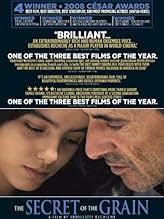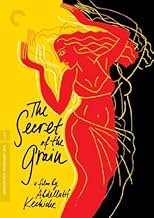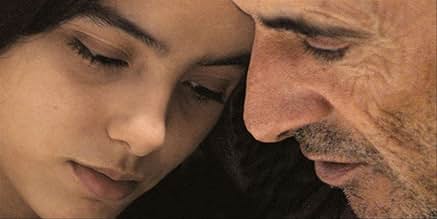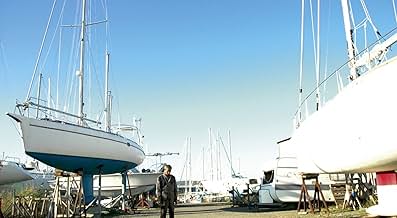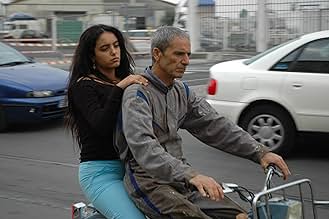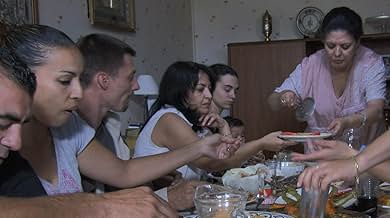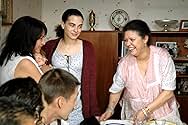La graine et le mulet
- 2007
- Tous publics
- 2h 31min
NOTE IMDb
7,4/10
8,1 k
MA NOTE
Dans le sud de la France, un ouvrier de chantier naval d'origine arabe poursuit son rêve d'ouvrir un restaurant en compagnie de la fille de sa conjointe.Dans le sud de la France, un ouvrier de chantier naval d'origine arabe poursuit son rêve d'ouvrir un restaurant en compagnie de la fille de sa conjointe.Dans le sud de la France, un ouvrier de chantier naval d'origine arabe poursuit son rêve d'ouvrir un restaurant en compagnie de la fille de sa conjointe.
- Réalisation
- Scénario
- Casting principal
- Récompenses
- 19 victoires et 9 nominations au total
Nadia Taoul
- Sarah
- (as Nadia Taouil)
Avis à la une
Something unusual happened at the end of this movie projection. Several people not knowing each other gathered at the cinema exit and discussed the movie. It appeared that the movie was spoiled by several cinematographic tics which the director promoted to the status of the style and used all over the movie "ad nausea". He extends the lengthy sequences probably to make us share the uneasiness of the characters in the given situation (the mother scolding the child for weeing in her panties, the guests waiting for the cous-cous, the final run of Slimane and the belly dance). But this is a 0-level translation of the reality into the cinematographic language. The profusion of the very close-ups and the clip-like filming with very short shots is a minor default. It is probably one of the points which makes some people like the movie as "modern". The movie is almost twice as long as usual and I can not find any cinematographic reason to make it this long, if not just the desire to convince the spectator (and jury) that this movie has something exceptional. We spent some good moments but we hope that this gifted director will not be encouraged to belaborates more in his future creations.
I have heard this film being compared to Eat Drink Man Woman, which is fair enough, if not slightly deceptive. Sure, there's a similar veneration for the art of cooking and how this draws and binds families. But the film casts a wider net than this may suggest. For me, it strongly resembles the humanistic and naturalistic stories of Robert Guédiguian, particularly La ville est tranquille (The Town is Quiet).
The actors are largely non-professionals. The use of long takes, including long stretches of dialogue, is very impressive and suggests that some of the script may be improvisational. I liked the chit-chat, the small details of daily life (like toilet-training a child), that films normally gloss over.
The film has a documentary look and feel and parts are like a fly-on-the-wall at a family gathering. For me, the importance of this is to convey how human this family is, with a rich and warm cultural heritage. In particular, it renders as impotent, irrational fears of Muslim culture.
The film works on multiple levels because it taps into the universal everyday concerns that potentially touch us all in one form or another: prejudice against immigrants, attitudes towards Islam post 9-11, globalisation, ageism in the workforce, the effects of poverty, family breakdown and more. Yet, importantly, the film is not preachy but merely presents life in a matter-of-fact way.
The female performances in the film are particularly affecting, especially the young Hafsia Herzi playing Rym, the daughter of Slimane's lover, and Leila D'Issernio who plays his Russian daughter-in-law.
At 148 minutes, the film is quite long, though this is not apparent until the final scene, which seems to be prolonged in real-time for a particular effect. On paper, the story looks like something we've seen before, but avoids all the clichés we might expect. I loved it.
The actors are largely non-professionals. The use of long takes, including long stretches of dialogue, is very impressive and suggests that some of the script may be improvisational. I liked the chit-chat, the small details of daily life (like toilet-training a child), that films normally gloss over.
The film has a documentary look and feel and parts are like a fly-on-the-wall at a family gathering. For me, the importance of this is to convey how human this family is, with a rich and warm cultural heritage. In particular, it renders as impotent, irrational fears of Muslim culture.
The film works on multiple levels because it taps into the universal everyday concerns that potentially touch us all in one form or another: prejudice against immigrants, attitudes towards Islam post 9-11, globalisation, ageism in the workforce, the effects of poverty, family breakdown and more. Yet, importantly, the film is not preachy but merely presents life in a matter-of-fact way.
The female performances in the film are particularly affecting, especially the young Hafsia Herzi playing Rym, the daughter of Slimane's lover, and Leila D'Issernio who plays his Russian daughter-in-law.
At 148 minutes, the film is quite long, though this is not apparent until the final scene, which seems to be prolonged in real-time for a particular effect. On paper, the story looks like something we've seen before, but avoids all the clichés we might expect. I loved it.
10jean-no
Abdellatif Kechiche did very well with his previous movie "L'Esquive". But here we have even better. The story is simple : I'd say it is mostly about dignity, sacrifice and family love. The acting is brilliant. Habib Boufares is perfect, the young Hafsia Herzi is astounding, especially for the end of the movie. The actors are mostly non-professional people but the script is very well written and the characters are well defined, so this "amateurism" does great and helps the audience's immersion. The cinematography is very special (but never disturbing), with a lot of very close close-ups. The camera is "natural" as with Casavettes, but not "drunk", it is not a pain to watch and you don't get sea sick. The whole movie reminded me the Italian neo-realism and also a little of Renoir. Some people mention Pialat. It's a quite long movie but you don't feel it while watching, you just realize it after.
It's the third movie of Abdellatif Kechiche (coming after "La Faute à Voltaire", and "L'Esquive"). All these movies deal in a way or another with the life of Tunisian immigrants in France.
This time in "Couscous" the director wanted to show his own background, the universe of his own family, Tunisian immigrants living in Nice, and especially he wanted to bring a tribute to his father, the man who had struggled for all his life to transmit a sense to all of them. It was not to be a biographical film, what Mr. Kechiche was looking for was to catch an atmosphere, and I would say, to catch the ethos.
The shootings have not been done in Nice, as the director feared to become much too sentimental. The chosen location was Sète instead, a small Mediterranean town, where the fishermen leave on their boats each morning and sometimes reach North Africa or the Asian borders, a town struggling with the same issues as everywhere in Europe nowadays: decline of production and unemployment, with the small shipyard challenged by concurrence, the fishing industry challenged the same.
The director had intended to ask his father to play in the movie and started to look for funding and to organize the team. Meanwhile the father passed away. Mr. Kechiche decided then to put a Tunisian actor in the role of the father. It was Mustapha Adouani, whom the director knew very well. Exactly when shootings were to start, Mr. Adouani fell gravely ill (he died after a few months), so they had to find on the spot another solution.
And the solution they found proved brilliant: they hired a non-actor, Habib Boufares, a worker from Nice, a lifelong friend of the father. The role fitted to him as a glove! Actually almost the whole team is of non-actors. The screenplay details were very loosely followed, the director left to the cast the full liberty to improvise. They were playing their own kind of life after all! And they lived their life there, in front of the camera (it was a hand-held camera , to not impede the non-actors in any way). This movie breathes trough all its pores of life, of authenticity, of immediacy! There are only a few professional actors in the cast. Hafsia Herzi (a young actress showing stamina and commitment) plays the step-daughter of the father, a very determined girl, sincerely attached to him and giving full support in difficult moments. There is also Alice Houri, bringing in a secondary role force and sincerity.
I have read the reviews to this movie. Many of them are very critical. The movie is excessively long, they say, and there are a lot of scenes that could have been much shorter without loosing anything. It is a 150 minutes film: one third is devoted to a dinner in family; the mother has prepared fish couscous (you could guess), an endless chat is about anything and nothing; a second third is devoted to a dinner on a boat-restaurant, where everybody is waiting for the main course (fish couscous, you betcha).
Well, it depends on your taste to like this movie or not (it goes the same with the couscous as a dish). I think the director took this risk, to let each scene to unfold on its own, regardless how long it was taking, for the sake of authenticity. He was interested in catching the universe of that community of Tunisian immigrants, in rendering it as natural as it really is; to get this way the ethos of that world. And he needed for this to not interfere in any way: neither by screenplay, nor by camera, nor by editing.
It is a family risking to disintegrate: the parents are separated, one of the sons is cheating his wife, there are tensions with the step-daughter. What keep them strong is the recourse to their specificity when need is: their cuisine, the wonderful plates with fish couscous. And their music and dance, in the most dramatic moments. There is a long scene of belly dance at the end of the movie: I don't want to say more, to not spoil the story. These guys speak only French and follow the French system of values. They keep however their cultural origins as assets.
Some reviewers mentioned "Eat Drink Man Woman" of Ang Lee: there also it is cuisine that keeps family against disintegration. I would mention also in this context "A Touch of Spice": a Greek family forced to leave Istanbul will keep their specific identity by keeping to "Politiky Kouzina", the way Greeks from Istanbul use spices in their dishes.
For me "Couscous" called in mind also "35 Rhums", another French movie whose heroes also belong to an ethnic minority in France.
I think somehow the family in "Couscous" and the movie itself resemble: both could disintegrate, both keep ultimately strong, the family keeping to their cuisine, the movie by keeping to the authenticity of this universe and by getting their ethos.
This time in "Couscous" the director wanted to show his own background, the universe of his own family, Tunisian immigrants living in Nice, and especially he wanted to bring a tribute to his father, the man who had struggled for all his life to transmit a sense to all of them. It was not to be a biographical film, what Mr. Kechiche was looking for was to catch an atmosphere, and I would say, to catch the ethos.
The shootings have not been done in Nice, as the director feared to become much too sentimental. The chosen location was Sète instead, a small Mediterranean town, where the fishermen leave on their boats each morning and sometimes reach North Africa or the Asian borders, a town struggling with the same issues as everywhere in Europe nowadays: decline of production and unemployment, with the small shipyard challenged by concurrence, the fishing industry challenged the same.
The director had intended to ask his father to play in the movie and started to look for funding and to organize the team. Meanwhile the father passed away. Mr. Kechiche decided then to put a Tunisian actor in the role of the father. It was Mustapha Adouani, whom the director knew very well. Exactly when shootings were to start, Mr. Adouani fell gravely ill (he died after a few months), so they had to find on the spot another solution.
And the solution they found proved brilliant: they hired a non-actor, Habib Boufares, a worker from Nice, a lifelong friend of the father. The role fitted to him as a glove! Actually almost the whole team is of non-actors. The screenplay details were very loosely followed, the director left to the cast the full liberty to improvise. They were playing their own kind of life after all! And they lived their life there, in front of the camera (it was a hand-held camera , to not impede the non-actors in any way). This movie breathes trough all its pores of life, of authenticity, of immediacy! There are only a few professional actors in the cast. Hafsia Herzi (a young actress showing stamina and commitment) plays the step-daughter of the father, a very determined girl, sincerely attached to him and giving full support in difficult moments. There is also Alice Houri, bringing in a secondary role force and sincerity.
I have read the reviews to this movie. Many of them are very critical. The movie is excessively long, they say, and there are a lot of scenes that could have been much shorter without loosing anything. It is a 150 minutes film: one third is devoted to a dinner in family; the mother has prepared fish couscous (you could guess), an endless chat is about anything and nothing; a second third is devoted to a dinner on a boat-restaurant, where everybody is waiting for the main course (fish couscous, you betcha).
Well, it depends on your taste to like this movie or not (it goes the same with the couscous as a dish). I think the director took this risk, to let each scene to unfold on its own, regardless how long it was taking, for the sake of authenticity. He was interested in catching the universe of that community of Tunisian immigrants, in rendering it as natural as it really is; to get this way the ethos of that world. And he needed for this to not interfere in any way: neither by screenplay, nor by camera, nor by editing.
It is a family risking to disintegrate: the parents are separated, one of the sons is cheating his wife, there are tensions with the step-daughter. What keep them strong is the recourse to their specificity when need is: their cuisine, the wonderful plates with fish couscous. And their music and dance, in the most dramatic moments. There is a long scene of belly dance at the end of the movie: I don't want to say more, to not spoil the story. These guys speak only French and follow the French system of values. They keep however their cultural origins as assets.
Some reviewers mentioned "Eat Drink Man Woman" of Ang Lee: there also it is cuisine that keeps family against disintegration. I would mention also in this context "A Touch of Spice": a Greek family forced to leave Istanbul will keep their specific identity by keeping to "Politiky Kouzina", the way Greeks from Istanbul use spices in their dishes.
For me "Couscous" called in mind also "35 Rhums", another French movie whose heroes also belong to an ethnic minority in France.
I think somehow the family in "Couscous" and the movie itself resemble: both could disintegrate, both keep ultimately strong, the family keeping to their cuisine, the movie by keeping to the authenticity of this universe and by getting their ethos.
Abdel Kechiche's tragicomedy is a film of contradictions and contrasts. It is both quiet and boisterous, with a script that is both understated and energetic, and which explores (among other things) how communities both accept immigrants, and yet remain suspicious of them.
Couscous follows sixty-something Slimane Beiji, a Tunisian-French shipyard worker in the French port town of Sète, played with reserved dignity by Habib Boufares. Despite being divorced, Slimane still spends a lot of time with his ex-wife and their extended family. The rest of his time is spent with his girlfriend and her daughter, who own a quayside hotel.
When Slimane is laid off, it comes as the last straw in a life that has become increasingly redundant. Left with nothing to lose, he hits upon the idea of opening a restaurant on an old boat. The project becomes a focal point for Slimane's extended family: his sons lend a hand with the boat's renovation; his girlfriend's daughter helps acquiring the necessary bank loans and official documents; and his ex-wife will cook the restaurants signature dish the eponymous couscous.
The restaurant works as a symbol of the hopes and dreams of immigrants how all they want is to integrate and work in their new community, whilst still retaining the culture and customs of their homeland. But it also signifies the duality of a community's attitude toward immigrants. During a party thrown to promote Slimane's restaurant, the guests all compliment their host and try their hand at a little Arabic; and yet, when Slimane's back is turned, they whisper amongst themselves that "he's not from around here." But Couscous really shines in its extended scenes of dialogue. At several points during the film we join Slimane and his family as they sit in kitchens or dining rooms and do nothing but talk. And it is a joy to watch. The script shows an eye for authentic dialogue, meandering through topics as diverse as racism in the workplace, the extortionate price of nappies, and using Arabic in the bedroom. The genuine performances from the supporting cast draw us further into these scenes, and the cinematography keeps us there. The camera squeezes between family members, getting the kind of intimate close-ups that give a real impression of a loud family dinner.
This light-hearted attitude, present in the early scenes, contrasts with a grimmer final third, in which situations get progressively worse. And as things get worse, family relationships start to break down.
This also reveals the film's ultimate irony. Slimane's family is a close-knit unit when the members each live separate lives. But when the restaurant brings them together, family unity dissolves and they resort to serious bickering.
Couscous follows sixty-something Slimane Beiji, a Tunisian-French shipyard worker in the French port town of Sète, played with reserved dignity by Habib Boufares. Despite being divorced, Slimane still spends a lot of time with his ex-wife and their extended family. The rest of his time is spent with his girlfriend and her daughter, who own a quayside hotel.
When Slimane is laid off, it comes as the last straw in a life that has become increasingly redundant. Left with nothing to lose, he hits upon the idea of opening a restaurant on an old boat. The project becomes a focal point for Slimane's extended family: his sons lend a hand with the boat's renovation; his girlfriend's daughter helps acquiring the necessary bank loans and official documents; and his ex-wife will cook the restaurants signature dish the eponymous couscous.
The restaurant works as a symbol of the hopes and dreams of immigrants how all they want is to integrate and work in their new community, whilst still retaining the culture and customs of their homeland. But it also signifies the duality of a community's attitude toward immigrants. During a party thrown to promote Slimane's restaurant, the guests all compliment their host and try their hand at a little Arabic; and yet, when Slimane's back is turned, they whisper amongst themselves that "he's not from around here." But Couscous really shines in its extended scenes of dialogue. At several points during the film we join Slimane and his family as they sit in kitchens or dining rooms and do nothing but talk. And it is a joy to watch. The script shows an eye for authentic dialogue, meandering through topics as diverse as racism in the workplace, the extortionate price of nappies, and using Arabic in the bedroom. The genuine performances from the supporting cast draw us further into these scenes, and the cinematography keeps us there. The camera squeezes between family members, getting the kind of intimate close-ups that give a real impression of a loud family dinner.
This light-hearted attitude, present in the early scenes, contrasts with a grimmer final third, in which situations get progressively worse. And as things get worse, family relationships start to break down.
This also reveals the film's ultimate irony. Slimane's family is a close-knit unit when the members each live separate lives. But when the restaurant brings them together, family unity dissolves and they resort to serious bickering.
Le saviez-vous
- AnecdotesShooting was supposed to start in the summer of 2005 but one of the leading actors was sick, which resulted in a major delay. Thus, filming actually started on 5 September 2005 and was still running by 16 January 2006. The set was on a boat in the port of Sète for at least six weeks from October to December 2006. Outside temperatures were very low, as opposed to what they should have been if schedule could have been held. This led the production to set up large tents near the boat with heating systems for the actors and extras to remain comfortable between takes.
- ConnexionsFeatured in Maltin on Movies: Flipped (2010)
- Bandes originalesEl fan hob wa imane
Written by Mohamed Abdel Wahab and Hussein El Sayed
Meilleurs choix
Connectez-vous pour évaluer et suivre la liste de favoris afin de recevoir des recommandations personnalisées
- How long is The Secret of the Grain?Alimenté par Alexa
Détails
Box-office
- Montant brut aux États-Unis et au Canada
- 86 356 $US
- Week-end de sortie aux États-Unis et au Canada
- 9 850 $US
- 28 déc. 2008
- Montant brut mondial
- 14 776 783 $US
- Durée2 heures 31 minutes
- Couleur
- Mixage
- Rapport de forme
- 1.85 : 1
Contribuer à cette page
Suggérer une modification ou ajouter du contenu manquant

Lacune principale
By what name was La graine et le mulet (2007) officially released in India in English?
Répondre
